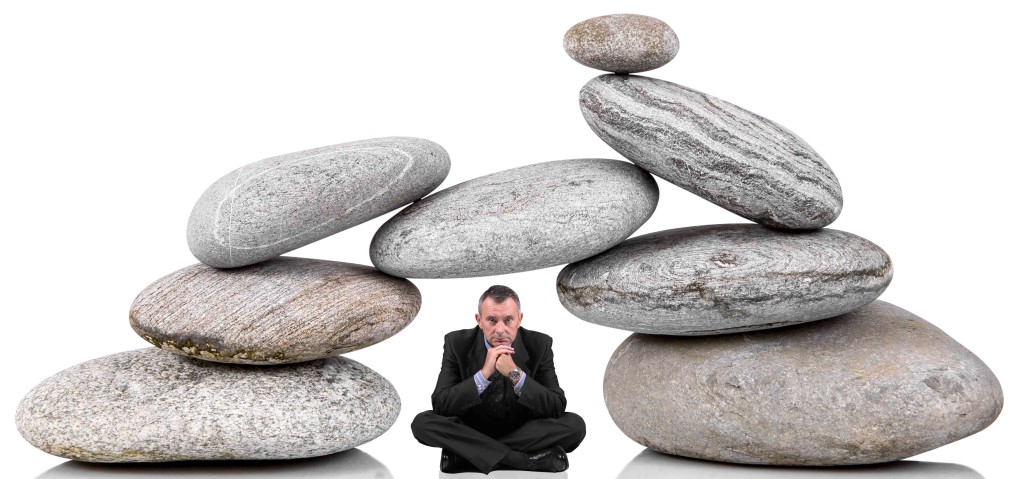7 ways to move beyond ‘Nice Girl’ to Thought Leader

I was raised to be a nice girl, to be seen and not heard, to do what I was told to do and not what the adults in my life did. I was taught that if I couldn’t say something nice, I shouldn’t say anything at all. It was important that I didn’t offend anyone. As a result of all that conditioning, my tendency has been to avoid conflict or confrontation of any kind. Imagine my dilemma when I found out many years ago that to be of any real value as a thought leader (speaker, trainer, author …) I needed to challenge their thinking; to poke and stir up thoughts; to offer choice. Being agreeable maintains the status quo. It validates people where they are and takes away their growth opportunity. Almost as important, without being disruptive in my unique way, I can’t stand out from the crowd and it’s less likely I’ll be commercially successful. What a journey it’s been to shift from the nice agreeable girl to embrace my spikey. Yes, it was there buried beneath the patina of socially appropriate behaviour. What did it take for me to make that shift? Here are 7 steps in that journey that can help you do the same: 1. Believe we add value So many of us either don’t see our talents and capabilities or fail to recognise their value. Without claiming this critical part of ourselves, we can’t make our contribution. Without recognising our value, we feel we have nothing to offer that can add to another person’s perspective. I’ve used the word believe purposefully. When I first started out in my own business, I had beautiful marketing materials that I never used. I realised they were developed from other people’s feedback and I wasn’t buying it. I needed to recognise my strengths and successes, understand the benefits they provided to others and feel that it was OK to say I’m good at this. I needed to own and embody my value. I needed to believe in me before I could expect others to. Equally, I needed to let go of being a generalist. In the early days of a speaking or training career, many of us look at other people’s success and think “I can do that” and we incorporate that capability into our offering. That old saying “If we don’t stand for something, we fall for everything” comes to mind. We need to draw our line in the sand and tell the world (or at least the niche we’re after) that this is what we stand for; this is what we offer and we’re damned good at it! Then we are in a position to offer value. 2. Listen to – then transform – the critical voice inside We all have a critical voice. Some are less critical. Some are loud while others are a mere whisper. It’s there and it is providing a running commentary on how we’re doing according to our internal filters. If we believe we’re good enough, that we have a right to be here and have a valuable contribution to make, our internal voice will be reinforcing those positive messages. If we sometimes (or often) question our worthiness, the value we bring and what we deserve in this life, our critical internal voice will reflect those filters. Whatever way we think will influence how we show up. That critical voice is simply providing us with information on how we really think about ourselves and the world around us. Given those beliefs are deep-seated, our critical voice is helpful in surfacing those beliefs so we can challenge the value they bring in our current situations and in relation to our dreams. Do they support or undermine our best efforts? We can be grateful for the voice and the information it provides … then choose to do what we need to. This is where courage comes in. We can’t make our unique contribution – in this case add another perspective so our clients can make wiser choices – unless we move past that critical voice that would have us play small to keep us safe. 3. Ensure the message is clear Yes, receiving feedback can be challenging. Giving it can also be hard, particularly if you’ve grown up with a credo of not offending anyone. I used to get so frustrated when I found the courage to provide my opinion and then it wasn’t understood. I realised that the nice way I wrapped up what I was trying to say obscured the message. If I wanted to get my message across, I had to peel back the niceness to reveal its core. If your tendency is to wrap the feedback up to make it more palatable, ensure that you haven’t buried the nugget so deeply it gets lost. 4. Focus on intent This starts with a personal question. Why am I giving this person feedback? ‘Is it kind, is it necessary?’ is a phrase I was taught years ago. Am I providing the disruption to demonstrate just how clever I am or am I truly seeking to be of service to the other person. Where it’s the latter, the desire comes through as part of the communication. If not, my ego seeking validation will be heard instead and that can set up an icky energy. Feedback is a gift. We often can’t see what’s going on in front of our noses; feedback is essential to expose and resolve our blindspots which are often the parts of ourselves that stand in our way. As thought leaders, we can be the light. So, to the second question: ‘Will it help the other person to hear what I could share? Is what I’m about to say the next natural step for that person for him/her to progress?’ Articulating the disruption, communication, feedback, seeking to resolve a conflict or enforce a boundary, however, can be difficult. I got to the point where I realised my clumsy
The upside of being uncertain & uncomfortable

Human beings generally don’t like discomfort of any kind: physical, mental, emotional, spiritual. We stop exercising (if we even start) when we get tired or our muscles start to complain. We exhaust our ‘bandwidth’ when confronted with ideas that stretch our mind or learn new skills that feel overwhelming. In doing so, we may walk away in the midst of chaos, not realising that chaos is a prelude to a breakthrough. We may find emotions illogical and hard to control so we don’t let them out to begin with or we find other people’s emotions very confronting. Or when our spiritual practice brings up questions we can’t answer or philosophies that seem to be at odds with our own experience of the world, we may disconnect or walk away. Yet, discomfort is a state that we are designed neurologically to experience. It’s role in our evolution is to signal that it’s time for the next stage of our human development. However, most of us don’t interpret it that way. We see it as a signal that we’re not good enough. We’ve seen the images about the comfort zone that tell us magic happens outside it. We know, if we’ve allowed ourselves to experience it, the exhilaration of pushing through fear and redefining what we’re capable of. We know we need to ‘dare greatly’ to quote Brene Brown. It might sound simple … it certainly isn’t easy. I believed for years that I was up for any adventure in my life. I learned that was true … and I needed 3 days notice! I wanted to be ready for whatever was coming at me. That is a typical desire for someone who feels he/she needs to be hypervigilant to protect themselves. Uncertainty is a natural part of our lives. There is very little out there that we can control. All we can control is our response to it. Yet so many of us persist, albeit unconsciously, in seeking to control the actual situations that create a feeling of uncertainty within us. Let’s bring it closer to home. We can’t change the poor behaviour of others wherever it may occur. We can’t make our manager behave more respectfully, appreciate our qualities and contribution. We can’t make our clients recognise the value we bring. We can’t force others to see the world the way we do. We can’t even impose control over our internal uncertainty. We might think we succeed because we’ve distanced ourselves from the feeling of uncertainty through our behaviours. However, the cause is still there, lurking beneath the surface. 1. Engage in a retrospective: If you look back on your life – however short or long – you will see that you have experienced uncertainty many times before … and survived! Recognising this may well calm the fear associated with uncertainty. 2. See the positive: We can recognise that uncertainty means we’re in new territory and understand that means we have an opportunity to grow. In doing so, we can convert the fear associated with uncertainty into the excitement of a new journey. 3. Listen to the message: We can pay attention to the uncertainty and what lies beneath to provide us with the next chunk in our development – what we need to eliminate, transform or take on 4. Address the low self-esteem / Imposter Syndrome: While we can’t change the fact that we live with uncertainty, we can personally reduce the unnecessary uncertainty that comes from feeling we’re not good enough by addressing the distorted belief. 5. Reframe our discomfort into a larger context: We can convert the energy associated with the uncertainty into something more constructive such as fulfilling our purpose – our big why. Everything in our lives has a duality. When we look, we can see a positive and a limiting aspect to any situation. We can and do benefit from both. We can hold ourselves in limitation which may protect us from failure and/or other peoples’ judgements. Or we may become positively infatuated with any situation. Only by balancing both aspects can we neutralise our response to the situation and come to a place of acceptance.
Is it time to get out of your own way?

I get in my own way. There I’ve said it. I’ve unintentionally undermined my own opportunities through self-doubt, procrastination, distraction. active sabotage and various other techniques I’ve perfected over the years. It’s a strange expression isn’t it. How can I get in my own way? I’m right here in this body. I can’t be in two places at once! That’s true. What’s also true is that we have amazingly powerful minds. I can see a situation play out : it feels real. I’m there in a flash. I don’t even go through the stages any more. I skip straight to the proverbial last page. The scenario is usually fear based. I’d better not do XYZ because I know how it turns out. While other people may push through in spite of the fear, my response – and that of a majority of women and some men – is then to pull back. I have, in the past, totally tripped myself up. I allowed an imagined situation to play out with disastrous consequences and then I acted as if it was real. I stepped back from opportunities I logically knew I could handle. I believed what others told me, giving their opinions greater validity than my own intuition. I allowed others to define who I am. At various stages in my life, I took everything personally as though all the challenges in the universe were put there just for me to deal with while others got a much easier ride (or so I thought). I said yes to situations I really didn’t want to get involved with and then resented the other person for asking. I kept my ‘little Spanish girl’ (the opposite to English and stitched up) firmly locked up, rarely allowing her to come out and tell it like it is, stamp her feet in temper, dance like crazy and live a passionate life. I could go on … and I think you get the picture. I lived a much smaller life than I could have if I had dared more; if I had got out of my own way. My prevailing view through so much of my life was – and I say it consciously – I wasn’t good enough. I didn’t measure up to other people and to their positively distorted views of me. In my darkest moments, I would rail at the universe demanding to know when I would be enough. The answer wasn’t out there. I finally realised I was creating everything: the good, the bad and the ugly. I created my own reality. And I was interpreting the world through a pair of glasses that eliminated all evidence that I actually was good enough. Each of us has an amazing and unique combination of talents, skills, capabilities and qualities. No-one else can do what we do in the way we do it. And when we take responsibility for the whole of our reality, we can operate – consciously at first – from the space of who we are, not the material outcomes we want from life. Getting out of our own way is a journey to ourselves; a journey of acceptance for all the gifts and the imperfections we bring. Yes, the journey can be challenging. Realising we’ve been undermining our own opportunities, hopes and dreams can feel extremely uncomfortable. Doing the work that helps us identify the blueprint we have for life and rewiring it can feel liberating. So, do you sabotage yourself? How do you get in your own way? And what has it cost you? Do you remember – or have you ever heard of – the movie Network? Peter Finch played the role of a washed up anchor on a fictional tv station, UBS, during the depression. From the movie, there are two lines that became an anthem for people feeling helpless and frustrated with the way things were. It’s the catch cry for change. “I’m mad as hell and I’m not going to take this any more!” If you’re tired of sabotaging yourself and living a smaller life than you could if you believed in yourself and felt you are good enough; if you have a dream you’re not getting any closer to, maybe you are mad enough to make the change? The path to getting out of your own way involves recognising you are enough, there is enough and you have enough to do what you need and want to in order to experience life at its fullest. The journey includes reclaiming and valuing you, recognising and challenging your patterned thinking and beliefs where they undermine you, rewiring your neurology to develop greater resilience and optimism, taking full responsibility for the world you have created and can create, even if you don’t fully understand what that means yet. The journey involves a commitment to you and participation in the greatest change programme there is – changing your mind about yourself! If you’re mad as hell that you’ve denied who you are, that you’ve held yourself back and finally you’ve had enough, it may be time to get out of your own way. Visit my website and my February/March public programme Skirting Leadership or Open to Possibilities.
